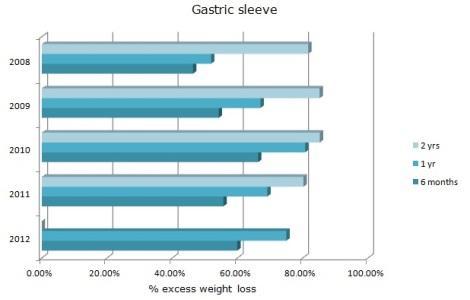 A recent study published by published by Dr. Ralph Peterli in the Surgery for Obesity and Related Diseases, has revealed that obese patients are able to keep their weight down to an acceptable range for a longer period of time when they undergo gastric sleeve surgery. Patients who underwent these procedures lost an average of 57.4% of their excess BMI over five years and kept it off.
A recent study published by published by Dr. Ralph Peterli in the Surgery for Obesity and Related Diseases, has revealed that obese patients are able to keep their weight down to an acceptable range for a longer period of time when they undergo gastric sleeve surgery. Patients who underwent these procedures lost an average of 57.4% of their excess BMI over five years and kept it off.
Laparoscopic sleeve gastrectomy or better known as gastric sleeve, was developed over ten years ago and wast not intended to promote weight loss. It was initially only used for high-risk patients before proceeding with a complicated procedure such as laparoscopic Roux-en-Y gastric bypass. For some patients, it is the initial step before proceeding with the duodenal switch procedure. Over time, clinical evidence has shown that the gastric sleeve procedure is a safer and more effective intervention in managing excess weight on obese patients than other more complicated procedures. As a result, several medical institutions such as American Association of Clinical Endocrinologists, the American Society for Metabolic and Bariatric Surgery, and even the Obesity Society, have updated their procedural guidelines to include the laparoscopic sleeve gastrectomy and its effective uses.
Dr. Peterli and his colleagues decided to conduct a study on a group of gastric sleeve patients and followed them for five years
In their study, Dr. Peterli and his colleagues included a total of 68 patients who underwent laparoscopic sleeve gastrectomy in their facility. This included patients who either went ahead with the procedure as a primary bariatric intervention, or as a repeat operation after an unsuccessful laparoscopic gastric banding between August 2004 and December 2007.During the time of the procedure, the average BMI of the participants was 43 and 78% the patients were female.
“The study revealed that the average loss in excess BMI after a year was 61.5%. After two years, it went down to 61.1%. By the fifth year, the average loss in excess BMI was at 57.4%. These losses correspond to patients who have a BMI loss of 12.6 kg/m2, 12.4 kg/m2, and 11.2 kg/m2, respectively.”
[thrive_link color=’orange’ link=’https://hopeforabetterme.com/special-report’ target=’_self’ size=’medium’ align=’aligncenter’]Click Here To Learn The 10 Deadly Bariatric Mistakes![/thrive_link]
According to the researchers, the main weight loss took place during the first year after the operation, and then continued a few years thereafter. Even the patients who went under sleeve gastrectomy after a failed gastric banding still showed a BMI more than 35 kg/m2 after five years.
This study also further revealed that patients who had other ailments aside from obesity, saw improvements in those as well.
Many of the patients who had type 2 diabetes before undergoing the procedure went into complete remission…
and those that didn’t were able to shift to less aggressive medications. In fact, only 25% of the patients who are insulin-dependent needed insulin therapy five years after undergoing laparoscopic sleeve gastrectomy. Two of them were able to shift to oral anti diabetic medications, and the rest remained in full remission at five years.
Over the course of the 5 year study, Dr. Peterli and his colleagues discovered that only 11.8% of the patients needed to undergo the procedure once again due to insufficient weight loss. This was mostly due to lack of diet and lifestyle changes and not a result of the procedure itself.
Gastric sleeve surgery is a smart option for many americans looking to lose severely needed weight. To find out the “10 Deadly Bariatric Mistakes To Avoid”, please follow this link.


























